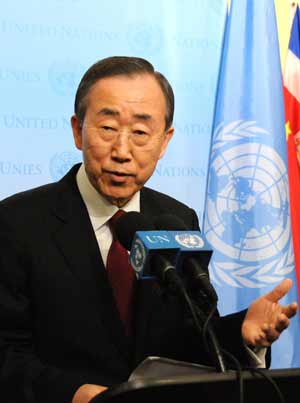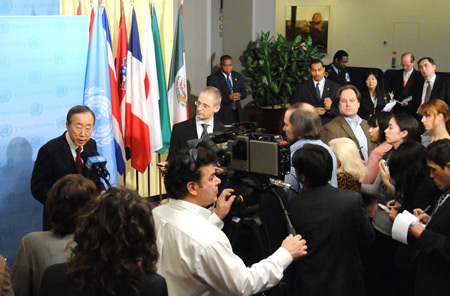Copenhagen climate accord offers mixed bag
 |
|
UN Secretary-General Ban Ki-moon speaks to reporters at the headquarters of the United Nations in New York, the United States, Dec. 21, 2009.?[Bai Jie/Xinhua] |
"The leaders were united in purpose but they were not yet united in action," he said. "That's what I observed."
Yet Ban emphasized the importance of the Copenhagen Green Climate Fund, established to help vulnerable countries adapt to the effects of climate change and adopt clean energy technology. Developed countries agreed to mobilize 10 billion U.S. dollars annually from 2010 to 2012, a price tag to increase to 100 billion U.S. dollars a year by 2020.
"All the elements (of the agreement) do not meet the full satisfaction of all member countries," he said. "But I think we got what we need to make this process move on."
Critics of the Copenhagen political accord contend that the negotiations were flawed both on substitutive and procedural terms.
The political accord failed to set emission targets either for 2020 or 2050, made no mention of a deadline for turning the agreement into a binding treaty, and did not establish an international body to verify emission cuts reported by each country.
"There is more work to be done," said Ban.
 |
|
UN Secretary-General Ban Ki-moon (1st L) speaks to reporters at the headquarters of the United Nations in New York, the United States, Dec. 21, 2009. [Bai Jie/Xinhua] |
"I will admit there was some lack of transparency because we were not able to fully concert with all 192 members states," said Ban. "At that time we only had one-and-a-half days for such a difficult negotiation."
The United Nations will begin reviewing lessons from Copenhagen to ensure that the climate summit in December 2010 to be held in Mexico will be more successful, said Ban.
The UN chief said he will announce early next year a high-level panel on development and climate change to strategically address how to streamline the negotiation process and enhance substantive matters.
The lack of transparency has been an on-going critique throughout the climate negotiations. On Sunday, the Telegraph reported that the head of the UN's climate change panel, Dr. Rajendra Pachauri, has made a fortune from his links with 'carbon trading' companies.
His worldwide portfolio, which includes banks, oil and energy companies and investment funds heavily involved in "carbon trading " and "sustainable technologies," is estimated soon to be worth trillions of U.S. dollars a year, according to the British newspaper.
As chairman of the UN's Intergovernmental Panel on Climate Change (IPCC), Dr. Pachauri could find himself in a conflict of interest as many of the companies he advises is dependent on the IPCC's policy recommendations.
When asked about the allegations, Ban replied in general terms, saying that businesses are bound to profit from a world-wide agreement on climate matters.
"Businesses psychology will shift with this political accord," he said. "As soon as this climate Copenhagen accord is translated into a legally binding treaty, I'm sure that the business community will shift their business operations towards a green growth economy."
 0 Comments
0 Comments






